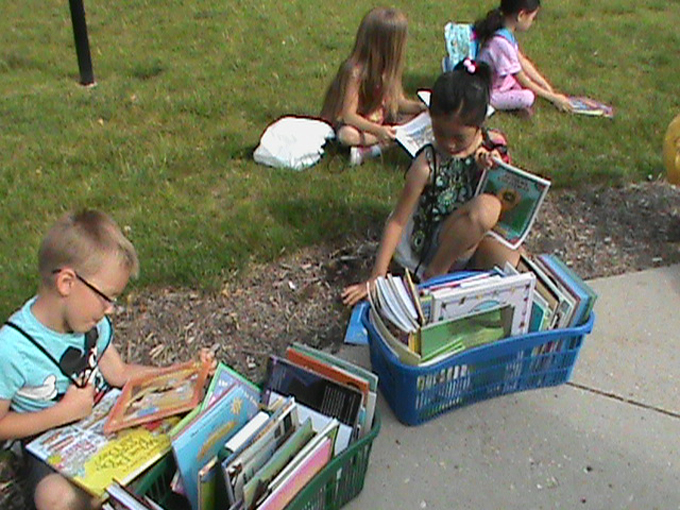 To ensure the well-being of every child, access to books over the summer is critical. We believe that creating lifelong readers starts with ensuring there is opportunity to promote the love and joy of reading year-round. During the summer months, when most children are out of school, access to books becomes even more important. Many children do not have access to books at home, which means they don’t read over those three months.
To ensure the well-being of every child, access to books over the summer is critical. We believe that creating lifelong readers starts with ensuring there is opportunity to promote the love and joy of reading year-round. During the summer months, when most children are out of school, access to books becomes even more important. Many children do not have access to books at home, which means they don’t read over those three months.
To keep the joy and love of reading moving forward, schools need to take a vital role in planning and executing summer reading initiatives.
We have spent the past eight years with grant-funded projects working to create balanced literacy schools, with a focus on creating year-round access to books. We developed summer reading initiatives with partner schools. These initiatives, which are unique within each school setting, were also drawn from our over three decades of working in our Summer Reading Clinic at the university.
We have learned both in our work within partner schools and our university Summer Reading Clinic that families want their children exposed to print-rich activities over the summer months. Often, families do not know how to help their children and do not have access to the resources needed to do so. However, with some guidance, these obstacles can be overcome, and students can continue to thrive and grow in their love and joy of literacy over these crucial summer months.
Following are some of the initiatives we employed at our partner schools.
A read-aloud picnic
Summer is the perfect time to enjoy outdoor spaces for reading. One teacher came up with the idea to hold a read-aloud picnic. Families were invited to bring a picnic snack and blanket to a cozy space on the school grounds. They sat and discussed the read-aloud topic and then enjoyed the interactive read-aloud. Adults were just as engaged as the children, asking questions and participating.
Summer book clubs
Children love to talk about books they have read. Book clubs, held at the school or a public library, are a wonderful venue to keep these conversations going over the summer. Schools can determine what book club selections will work for which grades. One school held a book club lunch, where students discussed their selection over their packed lunches. We have had good luck recommending the latest award-winning books from both the John Newbery Medal and Honor Book winners and Jane Addams Children's Book Award lists.
Partner with the public library
Partnering with the public library can have many benefits. Some public libraries have “pop-up libraries” that travel throughout the community to bring books to children and adults. These innovative libraries serve many goals, including bringing books and librarians to people who may not otherwise go to a library, showcasing the library’s many resources and activities, and allowing readers to connect. Librarians should ensure they provide a wide variety of subjects and genres that reflects the reading interests of all students. This has been most successful initiative in our summer clinic; the local public library comes every other week, rain or shine. The children are thrilled to have this opportunity to spend time selecting books, talking, and sharing their reading with others.
Reading incentive programs
One school partnered up with a local yogurt shop for an incentive program. Children who read a specified number of books, documented in their summer reading log, were given a voucher to get a free yogurt. This worked especially well with the younger children. Searching for community partners and what they can offer will depend on the community. In our summer clinic, children get a “free” book for every five they read. Getting to select a book to keep is a big incentive, and children often take their time making their selection, being very deliberate in their decision-making process.
School’s open for books
One of our initiatives was to open the school a few days over summer for students to come and select reading materials. Carts filled with inviting books were rolled out into the hall outside the principal’s office. Days and hours were flexible and generous. The principal, school secretary, and participating teachers stood by to greet the students and offer book suggestions. Family members who accompanied younger students were delighted by the availability of books.
Margaret Mary Policastro is a professor of language and literacy at Roosevelt University (RU) where she directs both the language and literacy program and is the Summer Reading Clinic director. The summer reading initiatives evolved out of the work in the RU Summer Reading Clinic. She currently is directing the RU IL-EMPOWER partnership with the Illinois State Board of Education working to improve underperforming schools.
Diane Mazeski retired after a rewarding career as a teacher and reading specialist in Mt. Prospect and Winnetka, Illinois. She is currently the associate director of the Summer Reading Clinic. Diane served as the literacy coach at Our Lady of the Wayside School and helped to implement the summer reading initiatives.
Debra Fisher is a first-grade teacher at Our Lady of the Wayside School in Arlington Heights, Illinois. While partnering with RU, she served on the literacy team helping to transform her school into a balanced literacy school. Debra was also instrumental in creating and supporting the school’s summer reading initiatives.